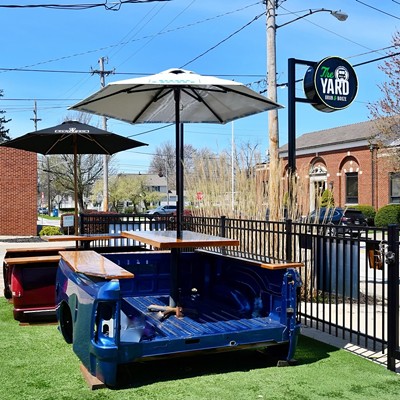"It certainly was interesting that a week after the piece was published that all of the sudden we're all being just reminded about appropriate action when speaking with the media," the employee says.
Employees "more or less" were encouraged to direct questions to Quicken's public relations department.
"It certainly was not a gag order," he says, "but it was a friendly reminder."
Another current employee who declined to be named says that Quicken as a whole is very touchy about news coverage and actively seeks out the identities of those who speak to the media anonymously — characterizing the process as a "very diligent" hunt to out those who talk.
That concern runs up the chain. When Scene made exploratory phone calls to employees on a Quicken story unrelated to the housing crisis, it received an unprompted email from Tad Carper, VP of communications for the Cleveland Cavaliers, asking what the Quicken story was all about.
That sensitivity has deep roots: In 2008, Crain's delivered an expose on a convoluted lawsuit involving Quicken-financed mortgages. The company contended a borrower had conspired to fraudulently purchase 16 homes through transactions with Quicken. However, Clark wrote in the Columbia Journalism Review, "Crain's saw the lender as part of a culture of 'easy money, rushed deals.'"
At the time, Gilbert was incredulous.
"Crain's came to these intellectually impotent conclusions over 16 loans where we are the plaintiff suing for fraud," Gilbert wrote in a response letter to Crain's. "The other approximately 400,000 loans we closed in all 50 states over the past eight years avoiding fraud, subprime and other short-sighted mortgage fads of the last decade somehow went unaccounted for in the articles."
Three years later, real estate reporter Michael Hudson of the Center for Public Integrity (CPI) took a deep dive into Quicken's record. To some, Hudson found, Quicken had in fact hopped the bandwagon on some of those mortgage fads. Between lawsuits from employees who painted a work culture unlike the one Gilbert portrays to the public, and cases involving borrowers who contended they were given a raw deal from Quicken, Hudson wrote those "claims are at odds with [Quicken's] squeaky clean image."
No local media followed Hudson's lead. When a reporter from CBS News asked Quicken for comment on the story, the company jumped to extremes. A spokesperson immediately sought to discredit Hudson, who has covered the finance industry for over two decades, and his outlet as a "not very credible source."
Nearly four years after the report was published, Gilbert contends that the Center for Public Integrity is "biased against us." During an interview, he provides a nine-page, daunting point-by-point rebuttal that was seemingly shared with local media outlets at the time Hudson's report was published.
Clearly the years-old perceived offense is still on his mind.
A tour of the (mostly) familiar
Quicken has some notable marks on its lending record: There's a $6.5 million settlement the company reached in 2009 with the Federal Deposit Insurance Corp. over loans it sold to the now-defunct IndyBank that turned sour. Quicken assumed no liability or wrongdoing.
There also remain a number of active lawsuits, which accuse the company of lessening its underwriting standards for loans when times were good. In particular, one case shows, at the very least, one homeowner in Detroit foreclosed on his home after receiving a loan from Quicken in 2006. It was a particular product that has earned the ire of consumer advocates and lawmakers in light of the housing industry's implosion.
What's interesting about the allegations, now seven years removed from the height of the crash, is Gilbert's insistence that Quicken exclusively slung quality product.
In a recent interview with Forbes (where he mused that "debt is what's going to kill you"), Gilbert said that Quicken avoided risky loan products and subprime borrowers.
To the casual observer, it would appear that those aforementioned circumstances conflict with the presentation of the company Gilbert has portrayed to the public. It seemed prudent to reach out to Quicken to ask for some face-to-face time with Gilbert on the company's relationship with the lending industry during the boom years — especially considering the impact it had on the nation.
'We just did not do them'
Dan Gilbert's 10th floor office in the Compuware building is within earshot of other employees, which you might not expect. Inside, there's a cut-out of his face leaning on one wall.
Opening conversation hinges on the friendly topics of favorite beer, Gilbert's idol, and his time, very early in his life, as a TV reporter.
He laughs. "You really did your research," then adds that he can't recall a reporter ever asking him about that time in his life. Gilbert had a sports show on a cable station at Michigan State University, where he graduated with a degree in telecommunications.
Eventually, he spent four months working for WKZO-TV in Kalamazoo, covering day-to-day news. He shared camera duties with a partner who would also read the news. He soon realized he didn't have the interest in pursuing a career as a reporter
"I just realized, I don't know, it just probably wasn't my thing," he says.
He reflects on the answer, and adds that he hasn't seen any footage in about five years. "I have to figure out where it is," he says, with a light laugh.
There's a mantra Gilbert reiterates when asked about what the company is doing in Detroit: "Do well by doing good." What's that about?'
"I think there's a belief, and maybe rightfully so, about how certain companies and corporations have behaved over the years," he says.
He uses that phrase to explain that, in fact, some companies are not merely "profit based." There are some that are also "mission based."
"We also don't believe there's conflict in that," he says. "There are a lot of people who believe there's a conflict in that — if you make profit it has to be bad."
That's not the case with Quicken, he says. Since the company moved to Detroit, it boosts morale and makes employees feel like they're not solely coming to work for a profit-making business. There's more at stake here.
"So that's the general way we look at it," he says. "You can do both ... in our case, we obviously picked up a lot of property that was very low priced and I'm sure we wouldn't plan on selling it for years, not decades, if ever."
He continues: "And I'm sure there's a built-in gain there, but ... for us, it was, let's get in, let's help these buildings and let's make it happen. And we just believe — one of our 'isms,' as hokey as it is, is 'money follows' — there's not necessarily a conflict in that."
Gilbert occasionally hits the table to emphasize points. At 5-foot-6, he carries a commanding presence into the room, answering questions with ease. He's wearing a brown-ish fleece and his hair is slicked back, like it looks in every photo of Gilbert.
"Isms," for the uninitiated, are Gilbert's 19 corporate mantras that are defined in a thick book given to every employee and seen throughout the workspaces of every company in the Quicken family. Examples: "There is no they." (Everyone is in this together.) "We eat our own dog food." (Employees should be the biggest fan of Quicken.)
Back to his point, Gilbert says, "There's clearly a conflict in people who do things they shouldn't be doing."
Which brings us to the central question: Why does he maintain Quicken never slung rotten loans? The company avoided it, he maintains.
Quicken could have sold those loans, Gilbert says, "But that doesn't matter. We're [still] collectible. We have reps and warranties on all these loans. They can come back to us. So we didn't do them. We just did not do them."
The issue at hand with the $6.5 million FDIC settlement relates to the so-called representations and warranties Gilbert alludes to. That refers to reference language included in any sale of loans that allows the purchaser to find loans that don't meet standards, and then require the originator to buy them back. The FDIC declined to comment about the settlement, citing agency policy.
But while Quicken may have been liable, the buy-back period was limited to a finite time span, typically up to one year, says Steve Dibert, founder of mortgage fraud investigation company MFI-Miami. After that, the repercussions of potentially shoddy loans were left to the purchaser. And if an auditor ever reviewed the package of loans, they reviewed a fraction of a percent, Dibert says.
Back inside Gilbert's office: Even so, he says, the buy-back of loans due to breached representations and warranties is common in the lending industry He takes pains to stress that this is unrelated to problems that led to the mortgage industry's implosion of 2007. It is common.
When Quicken sells a loan into the secondary market, Gilbert says there's two instances where the company must represent and offer warranties on what it has sold. First, he says, there's borrower fraud.
That is, "the borrower commits fraud on that loan and we just didn't catch it for fraud, and then we sell that loan, and then later on it defaults and [the purchaser catches] fraud in the loan ... they can push that loan back to us," he says. "Some borrowers are pretty damn good at fraud."
Then, there's internal fraud, "which was almost never the case," says Gilbert. "There may have been a handful of loans.
"This is something that has gone on for 25 or 30 years," he says of repurchasing mortgages. "[T]here's X amount of loans ... [and] a small percentage goes bad, which, when you're doing a large volume, can be a lot of loans, the first thing [the purchaser wants] to do is ask, 'Can we push the loan back?'"
What generally happens then, Gilbert says, is a negotiation.
"These settlements happen all the time," he says, adding, "This [was] just a routine settlement. We probably settled more than $6.5 million in loans this month with investors."
There are those who say Quicken escaped any liability because they immediately sold the rights to nearly 90 percent of the loans the company originated during the housing boom years, 2005 to 2007.
The lending model that became the name of the game was this: Quantity over quality. At the turn of the century, it became more typical for loans to be bundled into a pool, sold to another lender, and then eventually sold again into a mortgage-backed security on Wall Street.
But Gilbert bristles, saying it's commonplace for loans to be sold into the secondary market.
"Except for a handful of banks that just keep a handful of their loans in portfolio, on their balance sheet, every other loan that's originated in the United States — whether from a bank, mortgage company, mortgage broker — is sold into the secondary market," he says. "That was true then, [and it's] true now."











